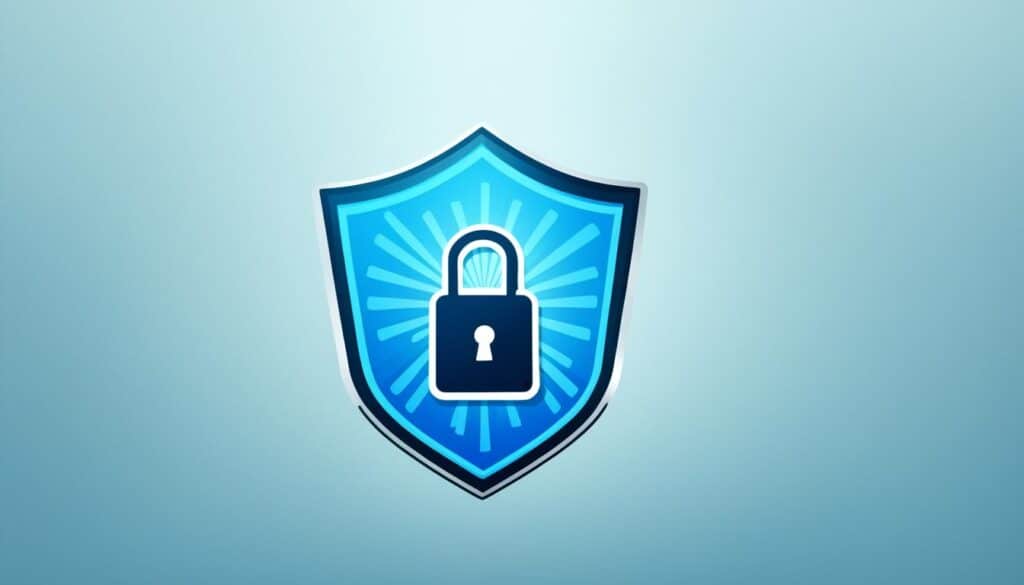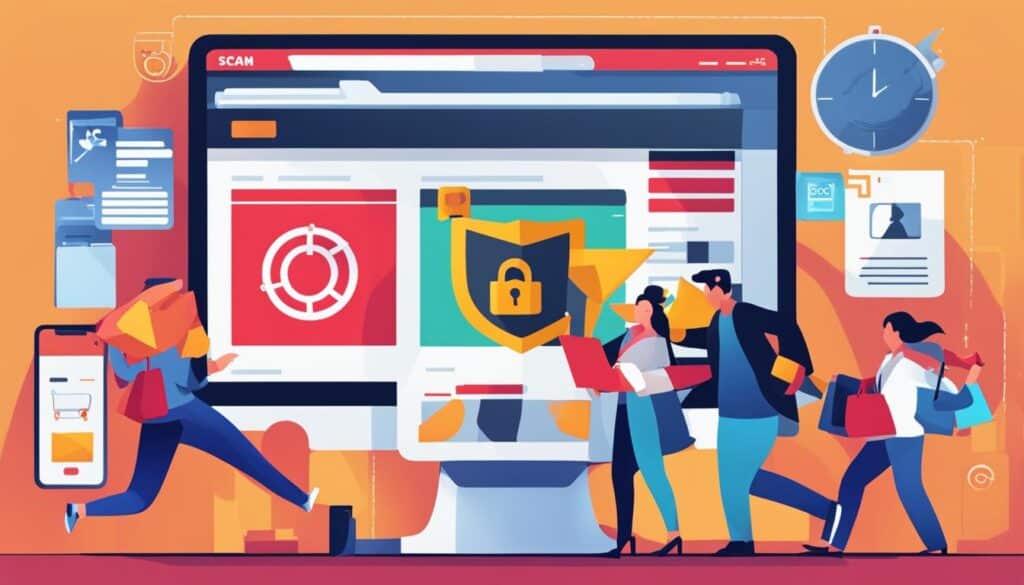
In online shopping, it is crucial to understand your legal rights and protections as a consumer. Scammers and fraudulent activities are prevalent in e-commerce, and knowing how to protect yourself is essential. Recent reports have highlighted cases of individuals falling victim to scams, losing significant amounts of money. The Federal Trade Commission has issued alerts warning consumers about these scams, emphasizing the importance of being aware and informed. In order to have a safe and fair online shopping experience in the U.S., it is necessary to understand your legal rights and the protections available to you.
Key Takeaways:
- Understanding your legal rights and protections is crucial in online shopping.
- Scammers and fraudulent activities are prevalent in e-commerce.
- Recent reports have highlighted cases of individuals falling victim to scams.
- The Federal Trade Commission provides alerts and valuable information to protect consumers.
- It is important to be aware and informed in order to have a safe and fair online shopping experience.
Common Online Shopping Scams and Red Flags
Online shopping scams are becoming increasingly prevalent, and consumers need to be aware of their existence to protect themselves from falling victim to fraud. One of the most common scams involves scammers posing as representatives from reputable companies like Amazon or the Social Security Administration, pressuring individuals into transferring money. These scammers often use fear tactics, threatening legal consequences if the victims don’t comply.
It is crucial to be cautious and recognize the red flags that indicate a potential scam. Some common red flags include unexpected phone calls, especially if they involve threats or demands for immediate money transfers. If something feels off or too good to be true, trust your instincts and investigate further before taking any action.
Recognizing Red Flags
Here are some red flags to watch out for when engaging in online shopping:
- Unexpected communication: If you receive unsolicited calls or messages from someone claiming to be from a reputable organization, be cautious.
- Threats and urgency: Scammers often use high-pressure tactics, creating a sense of urgency and fear to manipulate victims into making impulsive decisions.
- Requests for immediate money transfers: Be wary of any requests for immediate money transfers, especially if they claim severe consequences for failing to comply.
- Insecure websites and payment methods: Look for secure website URLs (https://) and reputable payment options like PayPal or credit cards with fraud protection.
- Offers that are too good to be true: If an online shopping deal seems too good to be true, it probably is. Research and compare prices before making a purchase.
Remember: It’s better to be safe than sorry. Always investigate transactions, verify the legitimacy of the seller, and carefully review the terms and conditions before making any payments.
By staying vigilant and recognizing these red flags, you can protect yourself from falling victim to online shopping scams and ensure a safer digital shopping experience.
| Red Flags | Actions to Take |
|---|---|
| Unexpected communication | Verify the identity of the caller or sender and be cautious when providing personal information. |
| Threats and urgency | Take a step back, research the situation, and consult trusted sources before making any decisions. |
| Requests for immediate money transfers | Never provide sensitive financial information or make immediate money transfers without verifying the legitimacy of the request. |
| Insecure websites and payment methods | Ensure that you are browsing on secure websites (https://) and using reputable payment methods with fraud protection. |
| Offers that are too good to be true | Research prices, compare deals, and be skeptical of any offers that seem too good to be true. |
Stay informed, trust your instincts, and protect yourself from online shopping scams.
Consumer Confidence and Economic Outlook
Consumer confidence plays a significant role in the online shopping industry. When consumers feel more confident about the economy, they are more likely to engage in online shopping and make purchases.
Recent reports indicate that American consumers are feeling more confident than they have in two years, with the consumer confidence index reaching its highest level since 2021. This positive outlook on the economy has a direct impact on online shopping, leading to increased consumer spending.
Despite the optimistic economic conditions, it is still essential for consumers to remain cautious and aware of their rights and protections while engaging in online shopping. The online marketplace can be both convenient and risky, so it is crucial to understand how to navigate it safely and protect oneself from potential scams.
To illustrate the recent surge in consumer confidence, refer to the consumer confidence index graph:
This graph visually demonstrates the upward trend in consumer confidence, indicating a positive economic outlook and a potential increase in online shopping activities.
Protecting Yourself in Online Shopping
To ensure a safe and secure online shopping experience, there are several steps you can take to protect yourself.
- Verify legitimacy: Always verify the legitimacy of the website or seller before making any purchases. Look for secure payment options and check for customer reviews and ratings.
- Secure connections: Use secure internet connections and avoid making purchases on public Wi-Fi networks. This helps safeguard your personal and financial information.
- Review terms and conditions: Before making a purchase, thoroughly review and understand the terms and conditions, return policies, and warranties. This ensures that you are aware of your rights as a consumer and can make informed decisions.
- Keep records: In case of any issues or disputes, keep records of all transactions and communications. This documentation can be helpful if you need to resolve any problems or protect your rights as a consumer.
By following these online shopping tips, you can reduce the risk of falling victim to online scams and protect your rights during transactions.
By being cautious and proactive, you can enjoy a secure and confident online shopping experience.
Consumer Resources and Support
If you encounter any issues or scams while engaging in online shopping, there are several resources and support services available to you. The Federal Trade Commission provides valuable information and resources to help consumers navigate the online shopping landscape and report scams.
Additionally, you can reach out to local law enforcement agencies, such as the Harris County Sheriff’s Office and the FBI, to report any fraudulent activities. It is also helpful to keep a record of your communication with scammers or suspicious individuals, as this can assist in investigations.
By utilizing these resources and support services, you can take proactive steps to protect your rights as a consumer.
| Consumer Resources | Support Services |
|---|---|
|
|
By staying informed and utilizing these consumer resources and support services, you can stay vigilant and protect yourself from online shopping scams.
Conclusion
Online shopping offers convenience and accessibility, but it also comes with potential risks. As a consumer, it is crucial to be aware of your legal rights and protections to ensure a safe and fair e-commerce experience. By understanding common online shopping scams and recognizing red flags, you can minimize the risk of falling victim to fraudulent activities.
It is important to take proactive steps to protect yourself while engaging in online shopping. Verify the legitimacy of websites or sellers, use secure payment options, and review terms and conditions before making any purchases. Additionally, keep records of transactions and communications in case of any issues or disputes.
If you encounter scams or fraudulent activities, there are consumer resources and support services available to assist you. The Federal Trade Commission provides valuable information and resources to navigate the online shopping landscape and report scams. It is also advisable to reach out to local law enforcement agencies if needed.
By staying informed, cautious, and vigilant while engaging in online shopping, you can protect your consumer rights and have a safe e-commerce experience. Remember to utilize the available resources and support services to report scams and seek assistance when necessary.
FAQ
What legal rights and protections do I have as a consumer in online shopping?
As a consumer in online shopping, you have legal rights and protections to ensure a safe and fair e-commerce experience. These rights include protection against fraudulent activities, the right to a refund or return for faulty or misrepresented products, and the right to privacy and data protection. It is important to familiarize yourself with your consumer rights and any applicable laws in your jurisdiction.
What are some common online shopping scams and red flags that I should be aware of?
There are several common online shopping scams that consumers should be aware of. These include fake websites posing as legitimate retailers, phishing scams through emails or text messages, and fraudulent sellers on online marketplaces. Red flags to watch out for include unusually low prices, requests for immediate wire transfers or gift card payments, and poor customer reviews or ratings. It is important to be cautious and trust your instincts when encountering any suspicious activities.
How does consumer confidence affect online shopping?
Consumer confidence plays a significant role in the online shopping industry. When consumers feel more confident about the economy, they are more likely to engage in online shopping and make purchases. This increased confidence leads to higher consumer spending and a positive impact on the online shopping market. Consumer confidence is influenced by factors such as economic conditions, job market stability, and personal financial situations.
What steps can I take to protect myself in online shopping?
To ensure a safe and secure online shopping experience, there are several steps you can take. Firstly, always verify the legitimacy of the website or seller before making any purchases. Look for secure payment options and check for customer reviews and ratings. Additionally, use secure internet connections and avoid making purchases on public Wi-Fi networks. It is also important to review and understand the terms and conditions, return policies, and warranties before making a purchase. In case of any issues or disputes, keep records of all transactions and communications.
What resources and support services are available if I encounter online shopping scams?
If you encounter any issues or scams while engaging in online shopping, there are several resources and support services available to you. The Federal Trade Commission provides valuable information and resources to help consumers navigate the online shopping landscape and report scams. You can also reach out to local law enforcement agencies, such as your local police department or the FBI, to report any fraudulent activities. It is also helpful to keep a record of your communication with scammers or suspicious individuals, as this can assist in investigations.
How can I ensure a safe and fair online shopping experience?
To ensure a safe and fair online shopping experience, it is important to be aware of your legal rights and protections as a consumer. Familiarize yourself with common online shopping scams and red flags to protect yourself from fraudulent activities. Take proactive measures such as verifying the legitimacy of websites and sellers, using secure payment methods, and understanding the terms and conditions before making a purchase. By staying informed, cautious, and vigilant, you can protect your rights and have a safe e-commerce experience.
Source Links
- https://www.kron4.com/news/business/ap-business/ap-american-consumers-feeling-more-confident-than-they-have-in-two-years/
- https://www.khou.com/article/money/consumer/grace-can-help/social-security-scam/285-26ef3501-1ab0-4532-97e1-e68edf11ee76










